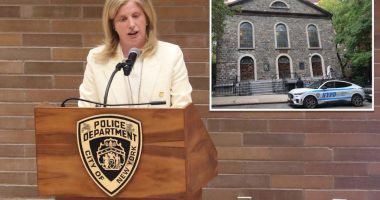Alexandra Judd, 37, was kept alive by an advanced form of life support reserved for ICU’s sickest patients.
Just after her twins Violet and Esther were delivered via caesarean at maternity hospital Frances Perry House last month Judd, from Hampton, almost died.

“My last recollection is somebody saying ‘she needs to be intubated’ and that was it,” she said.
Obstetrician Professor Mark Umstad said she “became acutely short of breath and then deteriorated very quickly”.
She was transported from the maternity hospital to the Royal Melbourne’s intensive care unit right next door.
Husband Tim was told to prepare for the worst, and rushed to the hospital.
“The real seriousness hit when the ICU called me and said ‘you need to come over here right now’,” he said.
“She’s the sickest patient we have in the ICU right now.”

Doctors put her on ECMO, an advanced form of life support.
“Her heart was not pumping, we said ‘we need to use something else here’,” Dr James Anstey from Royal Melbourne Hospital Intensive Care said.
“Without this extra support Alex wouldn’t have survived.”
Two days later she started rousing, receiving the first of many visits from her newborns, a rarity in ICU.
“It was amazing. They came together and I was able to hold them,” she said.
Judd had suffered a rare stress-induced cardiac condition.
“We call it ‘broken heart syndrome’. It’s seen after major traumas,” Dr Anstey said.
After a month in hospital the new mum and the twins went home to meet big three-year old brother Louie.
“Everyday I was starting to get a sense of how lucky I was that I was around to see the girls,” she said.
The family is sharing their story to showcase the teamwork of Royal Melbourne Hospital and Frances Perry staff and to demonstrate why medical equipment like she was able to benefit from is so critical.






